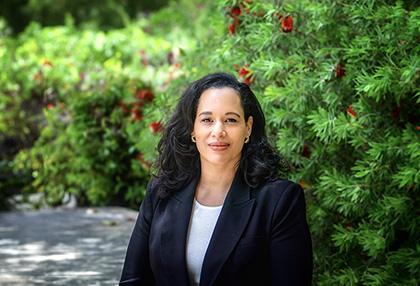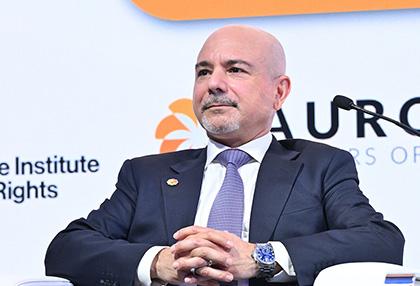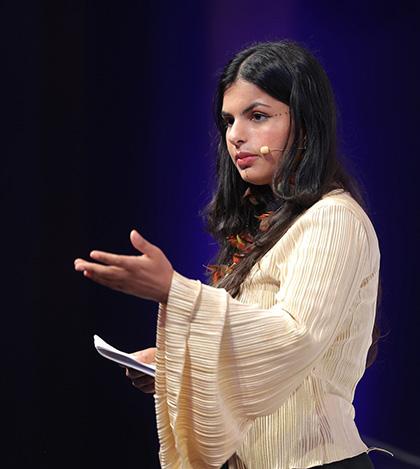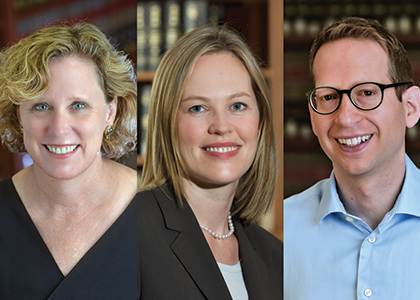
Climate Emergency and Human Rights
Roadmap for the Implementation of the Advisory Opinion of the Inter-American Court of Human Rights OC-32/25
The webinar will analyze the practical and strategic implications of the recent Advisory Opinion OC 32/25, issued by the Inter-American Court of Human Rights. The Opinion represents a fundamental development in international human rights law on climate issues, recognizing a jus cogens norm to prevent irreparable damage to the climate and the environment, reinforcing substantive and procedural rights, enshrining Nature as a subject of rights, and establishing differentiated obligations for States.
The panelists will respond to this key question: How are you using, or proposing to use, OC 32/25 in the context of national and international norm-setting, strategic litigation, legislation and public policy, social movements in defense of land and nature, and the rights of Indigenous peoples?
*This event will be held in Spanish with simultaneous interpretation into English.
Emergencia Climática y Derechos Humanos: Hoja de Ruta para la Implementación de la Opinión Consultiva de la Corte Interamericana de Derechos Humanos OC-32/25
El webinar analizará los alcances prácticos y estratégicos de la reciente Opinión Consultiva OC 32/25, emitida por la Corte Interamericana de Derechos Humanos. La Opinión representa un desarrollo fundamental del derecho internacional de los derechos humanos en materia climática, al reconocer una norma jus cogens de prevenir daños irreparables al clima y al medioambiente, reforzar los derechos sustantivos y procedimentales, y consagrar a la Naturaleza como sujeto de derechos, estableciendo obligaciones diferenciadas para los Estados.
Los panelistas respondrán a esta pregunta matriz: Cómo están utilizando, o proponen utilizar, la OC 32/25 dentro del ámbito de la creación de la normatividad nacional e internacional, el litigio estratégico, legislación y políticas públicas, movimientos sociales en defensa de la tierra y la naturaleza, y derechos de los pueblos Indígenas?
*El evento se desarrollará en español y contará con interpretación simultánea al inglés.
Featuring/Presentando

-
Sibelys Mejia
- Program Coordinator for Territories, Environmental Justice, and Peace at ILEX Legal Action
- Coordinadora de la Línea de Territorios, Justicia Ambiental y Paz de ILEX Acción Jurídica

-
Mariana Campos
- Coordinator of the Latin American Front of World’s Youth for Climate Justice
- Coordinadora del Frente de Latinoamérica para World´s Youth for Climate Justice

-
Gustavo Redin
- Environmental Lawyer, President of CEDENMA
- Abogado Ambientalista, Presidente de CEDENMA

-
Itzel Silva Monroy
- Legal Director, EarthRights Internatonal Latin American Office
- Directora Legal, EarthRights International Oficina de Latinoamerica

-
Moderated by/Moderado por Joseph Berra
- Director, Human Rights in the Americas Project,The Promise Institute for Human Rights at UCLA
- Director, Proyecto de Derechos Humanos en las Américas, El Institute de la Promesa de los Derechos Humanos de UCLA
Thursday, December 4, 2025
12:00 p.m. – 1:30 p.m.
(Los Angeles, PST / UTC-8)
2:00 p.m. – 3:30 p.m.
(Mexico City, CST / UTC-6)
3:00 p.m. – 4:30 p.m.
(Bogotá & Lima, COT / PET / UTC-5)
Zoom Webinar Only
In Spanish with Interpretation in English
Jueves, 4 de Diciembre 2025
12:00 p.m. – 1:30 p.m.
(Los Ángeles, PST / UTC-8)
2:00 p.m. – 3:30 p.m.
(Ciudad de México, CST / UTC-6)
3:00 p.m. – 4:30 p.m.
(Bogotá & Lima, COT / PET / UTC-5)
Solo seminario web de Zoom
Evento en Español con interpretación en Ingles
AND THE CRISIS OF
WORLD ORDER

Broken Spaces, Sandy Snowden, Textile/Quilt
REGISTRATION NOW OPEN
The world today is on an accelerated path toward rising authoritarianism, widening inequality, and unsustainable growth. This time of crisis has strained peaceful relations between people and nations, and has caused the decline of human rights.
Featuring a keynote from Dr. Albert Barume, UN Special Rapporteur on the rights of Indigenous Peoples, this day-long Conference seeks to engage the structural forces shaping our world in this moment and explore critically the role and relevance of human rights as a moral, political, and legal force for social action and transformative justice.
Where does the human rights project stand in relation to the struggle for human dignity, equality, repair of our relationship to the Earth, and the creation of alternative models of social life and organization? What is the role of legal frameworks and international institutions in ordering the world toward these values? What gives us reason for hope in this moment?
FRIDAY, JANUARY 23, 2026UCLA SCHOOL OF LAW
IN-PERSON ONLY
REGISTER NOW

This event will feature lawyers representing people currently detained in Salvadoran prisons. We'll hear from a Salvadoran lawyer who has been representing Salvadorans arbitrarily detained as part of the government's current enforcement against gang associates.
We'll also hear from UCLA Law student, Andrew Beale, who was The Promise Institute Summer Fellow at the Centro de Intercambio y Solidaridad. He will speak briefly about his work as a summer fellow.
Additionally, we'll hear from Silvia Serna who is part of Global Strategic Litigation Council and is working alongside three other organizations to represent people (who have been deported to El Salvador from the United States and then detained in Salvadoran custody) before the IACHR.
Monday, November 10, 2025
12:15 PM Pacific Time
Hybrid Event: On Zoom Webinar and at UCLA Law Room 1457
Register to AttendThe Promise Institute for Human Rights (Los Angeles) acknowledges our presence on the traditional, ancestral, and unceded territory of the Gabrielino/Tongva peoples.

UCLA School of Law professor Anna Spain Bradley, an expert in international law, international dispute resolution, and human rights, has been appointed to the MacArthur Foundation Chair in International Justice and Human Rights at the law school.

Rapid changes in the global order, finding optimism under great duress, rebuilding the international rule of law, and blazing a positive path forward were the issues at hand as thought leaders gathered at UCLA’s Luskin Conference Center earlier this month for the 2025 Human Rights and Humanitarian Forum.

Earlier in the day, Michael Waterstone, dean of UCLA Law, welcomed participants and emphasized the valuable role that each person played in carrying the cause of human rights.
“It is so fitting that this event is happening at UCLA,” he said. “As the dean of UCLA Law, I experience time and again just how important it is that we are situated here, in this global city of Los Angeles, where we have the opportunity to make a meaningful impact in so many ways, from the local to the international.”
“Our mission is to empower the next generation of human rights lawyers and leaders, and to engage research and scholarship to drive real-world impact,” said Catherine Sweetser, interim executive director of The Promise Institute. “It was inspiring to hear from young people like Ana Giménez Pozzoli, founder of Ducha de Sol, and Ayisha Siddiqa ’27, founder of the Future Generations Tribunal (and a UCLA Law student), about the environmental issues that are crucial to their generation.”
The forum included the probing discussions “Global Pulse Check,” “The Future of Human Rights,” “Modern-Day Heroes: Lessons in Resilience from Aurora Humanitarians,” “Rising Generation: Young Activists Redefining Justice and Humanitarian Action,” and “Health and Human Rights: Grassroots Approaches for Lasting Impact.”
Noubar Afeyan, cofounder and chair of the Aurora Humanitarian Initiative and founder and CEO of Flagship Pioneering, emphasized the importance of resilient action in the face of growing inhumanity around the world.
“Today, the inhumanitarians are winning,” he said. “We will all be facing choices as to when to speak up because it’s happening on our watch … . It puts even more pressure on the individuals to act both on the philanthropy side but also in the field actually saving the lives of others.”
While discussing the challenges and uncertainties facing the field, panelist Comfort Ero, president and CEO of the International Crisis Group, recounted the example of a group of Sudanese resistance fighters who decided to convert their resources into an emergency room in the midst of cruelty and humanitarian blockages.
“That in the onslaught of the violence and the horror and pain — that you would be able to transform yourself and work across sectors — that gives me hope: the ability of humanity to be innovative in a moment where we’re up against the wall,” Ero said.
“Throughout the day, we heard repeatedly from our speakers the value of empowering local actors around the world, looking for decentralized and community-led solutions,” Sweetser said. “Understanding that local shifts can have resonant impact worldwide is part of the promise of human rights and humanitarian work which makes it so worth pursuing.”

Three members of the UCLA School of Law faculty are featured in an essay that appears in the opinion section of The New York Times, which recounts the first 100 days of the second Trump administration. Ann Carlson, Ingrid Eagly, and Jon Michaels are among the 35 legal experts from around the country whom the Times quotes on matters ranging from the firings at independent agencies to President Trump’s clashes with the judiciary.
-
J.D Environmental Law
-
J.D. Business Law & Policy
-
J.D. David J. Epstein Program in Public Interest Law & Policy
 Hear from our amazing speaker lineup at the
Hear from our amazing speaker lineup at the2025 Human Rights & Humanitarian Forum
At the Crossroads:
Driving Integrated Action
for a Resilient Future
This year's Human Rights and Humanitarian Forum will feature a number of remarkable speakers from across UCLA. If you haven't registered for your spot, use the promo code and button below to save your seat!
At a time of intensifying global challenges, the 2025 Human Rights and Humanitarian Forum seeks to spark new, integrated approaches to tackling these issues. Hosted by The Promise Institute for Human Rights in partnership with the Aurora Humanitarian Initiative, the Forum will bring together eminent thinkers, frontline humanitarians, academics, legal advocates, and emerging leaders committed to advancing human dignity, justice, and sustainable peace.
By convening diverse voices under one roof, the Forum aims to seed lasting partnerships, inspire innovative solutions, and move us from "business as usual" towards a future where respect for human rights and effective humanitarian action go hand in hand.
Hear from extraordinary individuals including UCLA professors and scholars, Aurora Prize Laureates Marguerite Barankitse, Mirza Dinnayi, and Julienne Lusenge, as well as Pulitzer Prize Winner Dele Olojede, human rights and anti-corruption activist John Prendergast — and more!
Speakers Include:
 Chelsea Clinton, PhD
Chelsea Clinton, PhD- Vice Chair, Clinton Foundation & Clinton Health Access Initiative
- Adjunct Assistant Professor of Health Policy and Management, Columbia University
 Alina Dorian, PhD
Alina Dorian, PhD- Associate Dean, Public Health Practice, UCLA Fielding School of Public Health
- Adjunct Associate Professor of Community Health Sciences, UCLA
- Former Senior Health Associate, International Services, American Red Cross
 Dr. Eric Esrailian, MD, MPH
Dr. Eric Esrailian, MD, MPH- Board Member, Aurora Humanitarian Initiative
- Founding Donor, The Promise Institute for Human Rights
- Emmy-nominated film producer, The Promise
 Leymah Gbowee, MA
Leymah Gbowee, MA- 2011 Nobel Peace Laureate
- Founder and President, Gbowee Peace Foundation Africa (GPFA)
- Executive Director of the Women, Peace and Security Program, Columbia University
 Safiya Noble, PhD
Safiya Noble, PhD- MacArthur Fellow
- David O. Sears Presidential Endowed Chair of Social Sciences and Professor, UCLA
- Director, DataX Initiative, UCLA
 Ayisha Siddiqua
Ayisha Siddiqua- J.D. Candidate, UCLA School of Law
- Climate Advisor to United Nations Secretary-General
- Founder & Executive Director, Future Generations Tribunal
 Anna Spain Bradley
Anna Spain Bradley- Professor of Law and Faculty Director for The UCLA Promise Institute for Human Rights and The Promise Institute Europe, UCLA Law
- Former Vice Chancellor for Equity, Diversity and Inclusion, UCLA
Driving Integrated Action
for a Resilient Future
Wednesday, May 7, 2025
UCLA Luskin Conference Center
🐻 UCLA Students, Faculty and Staff!
Use code PROMISE at checkout to attend for free 🐻
The Promise Institute for Human Rights acknowledges our presence on the traditional, ancestral, and unceded territory of the Gabrielino/Tongva peoples.

At a time when the rules based international legal order seems to be imploding, it feels like it has never been more urgent to support international human rights law. But in order to defend human rights law, we must first understand why it was created in the first place. What is it that one is defending and why?
Join us to hear Prof. Frédéric Mégret in discussion with Prof. Máximo Langer. Prof. Mégret will shed light, not only on why the international human rights system emerged, but also on why we may want to continue investing in it despite all of its frailties. What might international human rights law achieve, in particular, that well developed cultures of constitutional guarantees of rights cannot achieve just as well? Prof. Mégret aims to problematize why we would want to guarantee human rights internationally, given some of the obvious limitations of doing so.
- Prof. Frédéric Mégret
- James S. Carpentier Visiting Professor of Law at Columbia Law School, Hans & Tamar Oppenheimer Chair in Public International Law and Professor of Law at McGill Faculty of Law, senior fellow at the University of Melbourne, and Visiting Professor at Sciences Po Paris
- Prof. Máximo Langer
- David G. Price and Dallas P. Price Chair, Professor of Law and Director of the UCLA Transnational Program on Criminal Justice at UCLA School of Law
Monday, April 14
12:15 PM Pacific Time
UCLA Law, Room 1430
Register to Attend